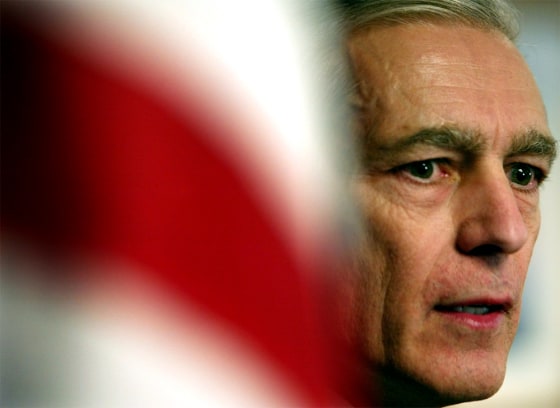Wesley Clark’s income quickly multiplied after his retirement from the military, rising to $1.6 million in 2002, according to financial records released Friday by the Democratic presidential candidate.
The bulk of that, just over $1 million, came from speaking fees and money the retired general received, including payments for his work as a military analyst for CNN.
Clark released five years of tax returns, military records and other financial documents.
He has proposed repealing the Bush tax cuts for families with incomes over $200,000 a year. Under his tax program, families with incomes of $50,000 or less would pay no taxes.
Clark and his wife, Gertrude, saw their family incomes soar after he retired in 2000 after three decades in the Army.
Their joint tax return shows an adjusted gross income of $92,673 in 1998 and $84,205 in 1999. In 2000, the income rose to $451,000, and in 2001 it was $755,000.
For 2002, the Clarks paid $129,717 in taxes on an income of $1.61 million.
$25,000 to $30,000 per speech
Clark’s documents show he regularly received $25,000 to $30,000 per speech in speaking fees.
As a military analyst, commenting mostly on the conflict with Iraq, Clark was paid between $10,000 and $38,000 a month by CNN, the documents showed.
The former NATO commander, who ran the war in Kosovo, has been gaining ground in polls for the Jan. 27 New Hampshire primary, narrowing the gap with front-runner Howard Dean.
Clark says increasing criticism of him from Dean and other Democratic rivals, and from Republicans, reflects the tightening race.
“I’m Karl Rove’s biggest nightmare,” Clark asserted Thursday night at a town-hall meeting, referring to Bush’s chief political strategist.
The retired four-star general portrays himself as the most electable of the seven other Democrats seeking to limit Bush to one term.
Clark said he is the only Democratic candidate with foreign policy experience, and he compared the role of commander in chief in dealing with world crises to major league baseball.
‘I will outpitch George W. Bush’
“I will outpitch George W. Bush,” said Clark, the former NATO supreme allied commander who ran the war in Kosovo against the former Yugoslavia.
Earlier Thursday, at a news conference in Manchester, Clark said it was up to Congress to determine whether President Bush’s march to war in Iraq amounted to a criminal offense.
Asked whether it would be criminal if Bush misled the nation in going to war, Clark told reporters, “I think that’s a question Congress needs to ask. I think this Congress needs to investigate precisely” how the United States wound up in a war “that wasn’t connected to the threat of al-Qaida.”
Clark defended his recent comments against the war after both his Democratic rivals and top Republicans complained that the statements were inconsistent with Clark’s past remarks, including testimony to Congress in October 2002.
He has called for a full congressional probe into why the United States went to war in Iraq, but his comments Thursday marked the first time he had hinted at possible criminal wrongdoing.
Clark said Bush misled the nation on Iraq. “This was an elective war,” he said. “He forced us to go to war.”
Denials of a shift on Iraq war
Clark denied changing positions on the war, renewing his assertion that he had opposed it all along. Earlier in the day, Ed Gillespie, the RNC chairman, traveled to Arkansas — Clark’s home state — and criticized the Democratic candidates, singling out Clark and arguing that he had altered his position on the war for political gain.
The RNC also released a transcript of Clark’s testimony in September 2002 to the House Armed Services Committee in which he called Iraqi leader Saddam Hussein a clear threat and said military action could not be postponed indefinitely.
Clark told reporters it was a sign that his campaign was succeeding.
“It looks like they’ve finally figured out that I’m George Bush’s greatest threat,” he said.
In Arkansas, Gillespie quoted a published report that Clark claimed he would have become a Republican “if Karl Rove had only returned my phone calls.”
Clark ridiculed the suggestion. “I never called Karl Rove, and I never was going to be a Republican,” he said.
Former Vermont Gov. Howard Dean, who has seen his commanding lead in polls in both Iowa and New Hampshire evaporate in recent days, has accused Clark of being a closet Republican.
Clark concedes he voted for Republican Presidents Nixon and Reagan, but says it was during the Cold War and both were strong on national defense.
Otherwise, Clark says, he has voted for Democrats.
